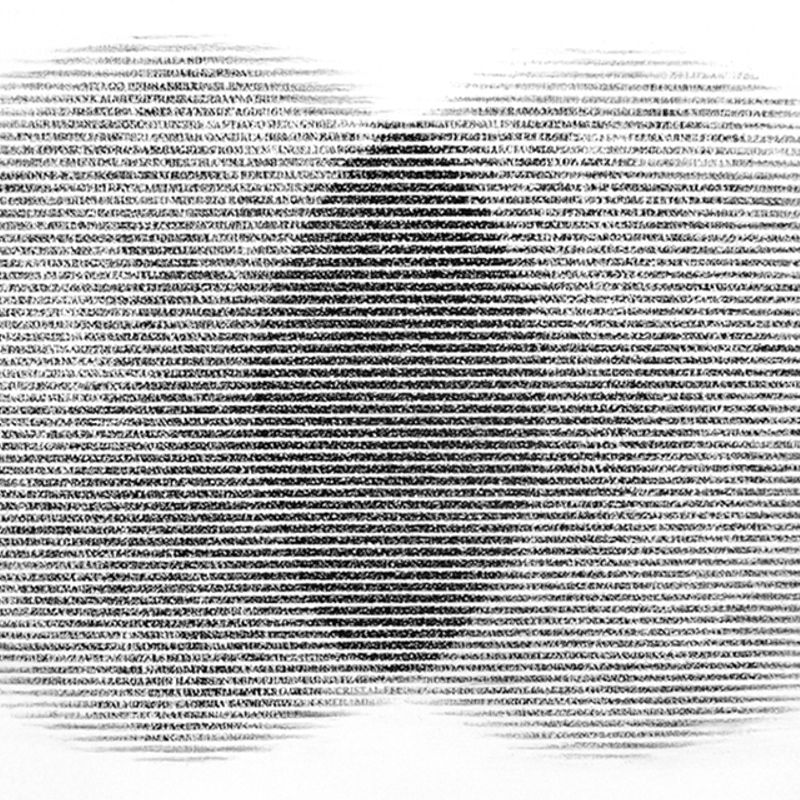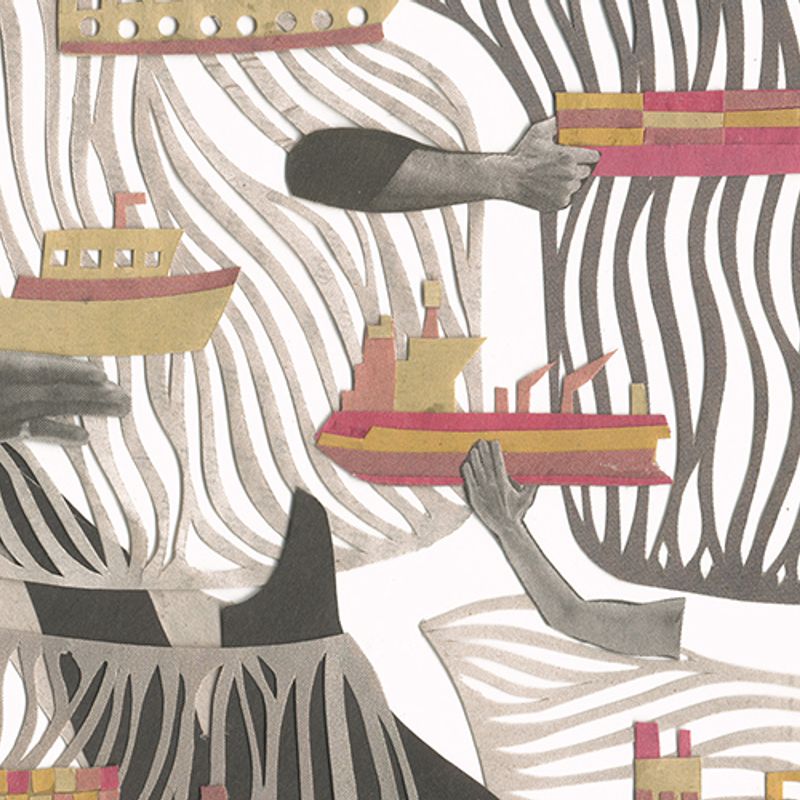Behind the Poems
by Beth Staples▴▴▴
I started “The Road Over Catawba Mountain” in the backseat of a friend’s car while driving from Virginia into West Virginia. It was nighttime and it was raining, and we realized we’d made a mistake taking the state road instead of doubling back for the highway, but too late—we’d passed any exits miles ago.

If you’ve lived in the mountains, maybe you know this kind of road. Two narrow lanes: one curved tight around the land, and the other—our lane—open to the drop down the mountainside. No guardrails, no lights. I thought about how little care had been given to making the road convenient, safe, anything more than functional. If the road showed us such little care in return, we could end up on the side of the mountain forever.
Even if our historical record disappeared, future generations could map some of our values based on how and where we invested in infrastructure. Where most of us congregated, of course. But also where we provided safety, and where we didn’t. Which places we decided were worth getting to quickly. Where we put our shoulder to nature and pushed, forcing our way through, and where we didn’t—or couldn’t, at the time. And why it was worth it to us. And why it wasn’t.
With this poem, I wanted to invert the lens these decisions are made through—imagining that the road, seeing us, could understand its position in our world and still provide us with more grace than we often show ourselves.
—D. M. Spratley
▴▴▴

“Writing Persian” confronts my experience of writing in a second language. I had stopped writing poetry after a teacher told me it was impossible to write a great poem in English if English wasn’t my native language. This was a pity, because one should always be encouraged to explore, share, and learn. I took his idea seriously because I knew my poems weren’t good but I didn’t know why. Ultimately, I needed to write, yet I didn’t believe in my poems and didn’t share them. Writing poetry became my personal journey and a way to wander in language. Years later, when I applied for an MFA, I had overcome my anxiety and shame. I had things I wanted to share, and I wanted to learn from others. I also realized I appreciated and loved English in special ways. People do and say amazing things in languages that are not their own, and I am not only thinking of writers like Vladimir Nabokov and Joseph Conrad. The perspective of an outsider and knowing other languages can even be an asset. I wanted to write about that experience.
In my revisions, “Writing Persian” also moved from expressing shame to considering pride. The tone changed. The earliest drafts were darker, yet humor that started to appear made the poem possible. Previous versions were also more elliptical, but I didn’t want to hide behind a veil. I chose a more prose-like and narrative style. Later, the poem evolved beyond a prose poem. The use of lines opened new readings, and the empty space on the page allowed the sentences to breathe. The list of words at the end is drawn from an earlier series, in which the title of each poem is an English word with Persian roots.
—Kaveh Bassiri
▴▴▴

I met a doctor in a bar several years ago who had escorted one of her patients to Juarez, Mexico to have his leg amputated. He had a form of body dysmorphia called apotemnophilia that made him attracted to people with amputations. Nobody in the States would touch the leg. For reasons beyond my psychoanalytical abilities, he thought if he amputated one of his legs, it would make sex even better. With himself? Unclear. For me, the real groovy psychological stuff was going on with the doc though. I couldn’t tell if she actually thought she was “treating” this guy, or if she thought it would be a cool story to tell at the bar afterward. Well, I’m still retelling it… This was a long time ago now—I don’t meet people like this much anymore.
What does this have to do with my poems? The poems started as fiction. I really wanted to include the stuff about the leg in a short story collection, but every time I try to write fiction it becomes overly autobiographical—I don’t have that problem with poetry, thank god—and what originally came out read like reportage or really bad confessional nonfiction.
In an early draft of the story I tried to write, the amputee ended up in El Pastor’s lunatic asylum in Juarez that is overlooked by a giant white horse inscribed on a mountain. While I had him in there, I made him write daily diary entries, which would later turn into the series of poems collected here. For some reason, I started to use voice-recognition software to write these diary entries, but at that time the software couldn’t keep up all that well, so the entries actually sounded a little crazy and, happily for me, very paranoid—a happenstance that would later prove inspirational.
In one entry in particular, I started to free-associate about music and technology. I then imagined all the daily entries as Pandora radio stations—each diary entry was represented by a different artist: John Prine, Willie Nelson, Waylon Jennings—as you can tell, I was on a country kick. Maybe because I was writing so close to Texas.
In case you’ve never examined the options associated with individual Pandora radio stations, you can click an option called “Why was this track chosen?” and Pandora will then give you a breakdown of the song’s musical genealogy. I basically stole the voice of Pandora’s auto-generated song descriptions for these poems, modifying it, of course, by creating a kind of omniscient, salesmany voice that lends really creepy advice about the reader’s inner life. These poems are a continuation of that experiment. (You’re going to like these poems, you really are. They’re just what you need.)
By the way, I got the chance to meet the amputee some months after the operation. He was having difficulty walking because surgeons performed the amputation well above his knee. He had two of those crutches with the cuffs that go around each forearm and a prosthetic leg hidden beneath his linen slacks. He was beaming from ear to ear.
—Michael Brooks Cryer
▴▴▴

In the wilderness of my poem “Altarpiece With Wolf at Door,” the earliest drafts were figures of wolf and self—a lost body, searching for definition in wild grasses. Then the draft got its oxygen in a prompt from the brilliant poet Jennifer Givhan, who asked for a poem that was an altarpiece—possibly a triptych. Suddenly, the poem needed to unfold, open out. As I entered the holy space it created, it asked for more: a breaking open, a getting down on my knees.
With the move from one to three panels, I found the poem could extend from just self to self, father, and mother (and mother, and mother). It swelled to reveal not only a wolf, but a horse and a fox—inviting in questions of hunger and magic. In this way, a poem about one body opened to include other possibilities; the poem found a kind of prayer and revealed a sapphire door.
In terms of its form, the altarpiece got me thinking about knowing the body on, and across, the page. This stretching put me to work with repetition and interruption (“pretty,” and the widening scope of “stars and stars”). It also made me wonder how a body might search for itself and make room for that search on the line. I thought about suspension, and the poems of Mina Loy, whose spaces between words enact visceral experience. Across the text’s fields and meadows, I tried to use space to engage breath—finding the inhale and exhale, and also (I hope, at times), a gasp.
—Sally Rosen Kindred
▴▴▴

My poem “Admiral of the Ocean Sea” is mostly invented (do they really even make narwhal codpieces?), but one of its weirder elements is quite historical. On his third voyage, as he approached the mouth of the Orinoco, Christopher Columbus took some anomalous measurements of the North Star and concluded, not that his technique was flawed, but that he must be sailing uphill, and therefore the world is not round after all. Columbus was not the last man on a road trip who moved heaven and earth to avoid admitting that he had misread the map, but his report back to his royal patrons framed this in a unique way: the far side of the earth, he said, is shaped like a woman’s breast, complete with nipple. When I read this, it seemed to say so much about gender and entitlement, conquest and exploitation, that it stayed in the back of my head for months.
Then one day I awoke with the poem’s first lines running through my head. Aqua-man was inspired by a man we saw in a pub in County Kerry, standing and chatting at the bar in a wetsuit on Easter Sunday. The fear of dishwater I owe to a long-ago girlfriend, the fear of the garbage disposal…well, who among us does not fear garbage disposals?
But where to go from here? It occurred to me then that Columbus and his geo-nipple had the same combination of ludicrous and appalling masculinity as the man with the narwhal codpiece. My task from that point was to go as long as I could without mentioning the President.
—Roy White
▴▴▴

When Poetry released their February 2009 issue, I was nine months out of grad school. In that issue, they ran a series of manifestos. Ange Mlinko’s ends with: “I will not be writing any ‘book-length projects.’” That claim always stuck with me, the way some random insult from third grade hovers over me when I feel like I’ve talked too much (Matt Miller called me an idiot on the bus because I didn’t know how to not talk).
Mlinko’s claim influenced my aesthetic for years, because I, too, saw a move toward “projects,” which I read as a move away from highly-focused, interesting poems. In other words, the projects became more significant than the individual poem, or so it seemed at the time. Now, I write mainly projects. The change happened because, I think, change happens, and change is good. Mlinko’s claim still haunts me, but now, I think of it more as a challenge to write solid poems within a longer project.
So, Clownface, this book-length project, follows the Clown as he uses the Memoirs of Joseph Grimaldi as a sortes secularaem, trying to find some purpose by following the First Great Joe.
Regarding the genesis of the project: I read Grimaldi’s biography one summer, and I loved the narrative, loved the idea that he chose to spend his life being laughed at by strangers. I wanted to explore the necessity of being liked, which seems fundamental to our twenty-first-century cultural aesthetic.
Granted, maybe that’s all ridiculous, because, sure, the world probably doesn’t need clown poems right now.
But, here I am, writing them.
—Patrick Whitfill

